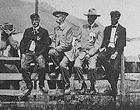The long struggle of ex-slaves and their children to reclaim their Reconstruction-era civil and political rights ultimately proved successful, but it met with stubborn resistance from Southern whites for decades. The commonplace notion that the South lost the war and won the peace was accepted because in large part it was true. The defeat of the Confederacy, ironically, fueled the defiance of white Southerners. The myth of the "Lost Cause" deserves considerable credit for the "resurrection." First postulated almost immediately after the war, and lent considerable momentum by former Confederate General Jubal Early during the 1870s and 1880s, the argument held that the South had fought for a noble cause; had a constitutional right to secede; had been led by morally superior leaders; had fallen short in its quest for independence due only to the North's superior resources; and had been motivated by the defense of the Southern homeland and states' rights, not chattel slavery. This genteel and decontaminated narrative of the Civil War justified both massive resistance to concepts of equality and the inferior social and economic position accorded African Americans.
The sesquicentennial years present a unique opportunity to assess anew the many legacies of the American Civil War. Some of these, such as the economic and physical growth spurred by the war, are beyond contesting. Others are not. The question of whether African Americans now may enjoy their full constitutional freedoms continues to vex many in public and private life and is often a contentious source of political and social debate. Some Americans continue to question the primacy of the federal government and sound the alarm on behalf of states' rights, especially when social and economic pressures are greatest. And still others contest the landscape of historical memory, challenging one another's narratives and too often ignoring the historical record in favor of comfortable tales passed down from one generation to the next. What Americans know about the Civil War, and what they believe about the Civil War, are sometimes uncomfortably far apart.
In 1998 in Lee and His Generals in War and Memory, the noted Civil War historian Gary Gallagher presciently established a measure of success for the sesquicentennial. Americans will accomplish something of great value, he argued, if we are able to confront "the wider issue of how the Civil War should be presented to the American people, and why academic and popular conceptions about the conflict are often so the different." Narrowing that conceptual gap would create a new legacy of great value 150 years after Americans shed so much blood.
This essay is taken from The The Civil War published by the National Park Service and Eastern National. This richly illustrated handbook is available in many national park bookstores or may be purchased online from Eastern at www.eparks.com/store



